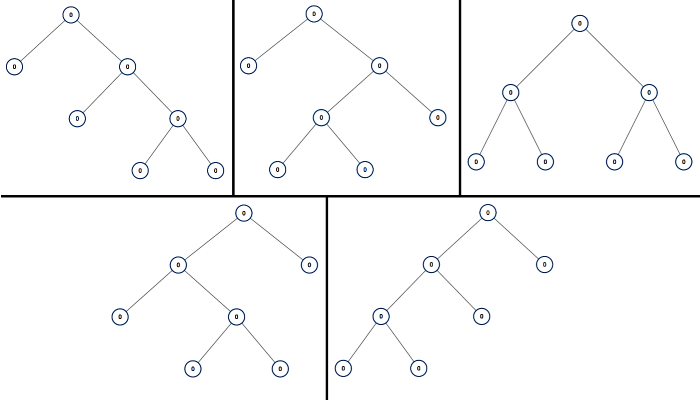Problem
Given an integer n, return **a list of all possible *full binary trees* with** n nodes. Each node of each tree in the answer must have Node.val == 0.
Each element of the answer is the root node of one possible tree. You may return the final list of trees in any order.
A full binary tree is a binary tree where each node has exactly 0 or 2 children.
Example 1:

Input: n = 7
Output: [[0,0,0,null,null,0,0,null,null,0,0],[0,0,0,null,null,0,0,0,0],[0,0,0,0,0,0,0],[0,0,0,0,0,null,null,null,null,0,0],[0,0,0,0,0,null,null,0,0]]
Example 2:
Input: n = 3
Output: [[0,0,0]]
Constraints:
1 <= n <= 20
Solution
/**
* Definition for a binary tree node.
* function TreeNode(val, left, right) {
* this.val = (val===undefined ? 0 : val)
* this.left = (left===undefined ? null : left)
* this.right = (right===undefined ? null : right)
* }
*/
/**
* @param {number} n
* @return {TreeNode[]}
*/
var allPossibleFBT = function(n) {
var dp = Array(n);
dp[0] = [new TreeNode()];
return solve(n, dp);
};
var solve = function(n, dp) {
if (dp[n - 1]) return dp[n - 1];
var res = [];
for (var i = 1; i < n - 1; i += 2) {
var left = solve(i, dp);
var right = solve(n - 1 - i, dp);
for (var j = 0; j < left.length; j++) {
for (var m = 0; m < right.length; m++) {
res.push(new TreeNode(0, left[j], right[m]));
}
}
}
dp[n - 1] = res;
return res;
};
Explain:
Bottom-up with dynamic programming.
Complexity:
- Time complexity : O(2 ^ (n / 2)).
- Space complexity : O(n * 2 ^ (n / 2)).